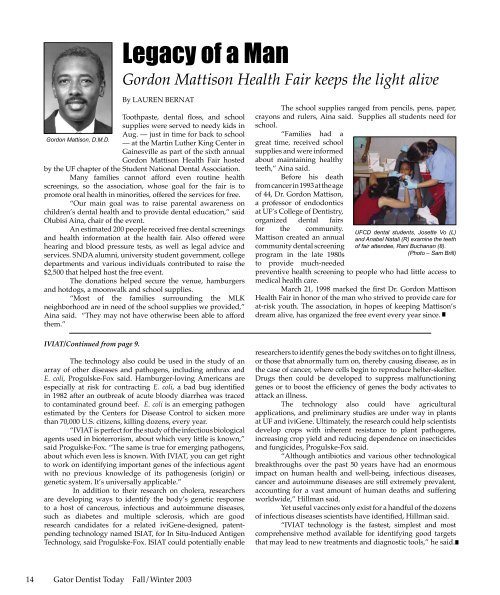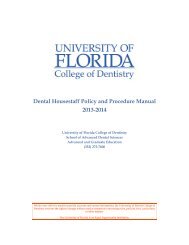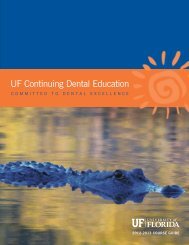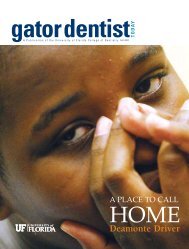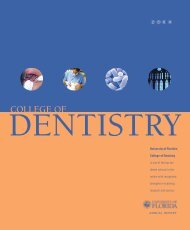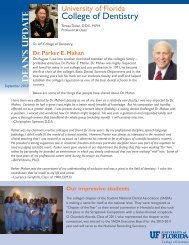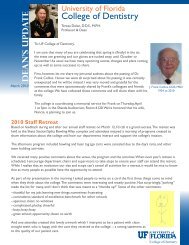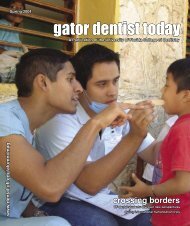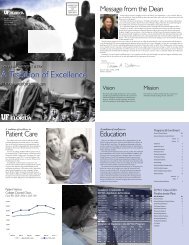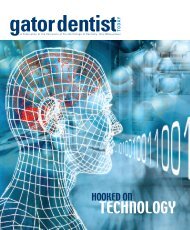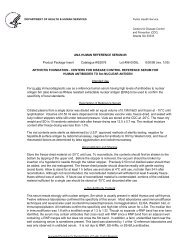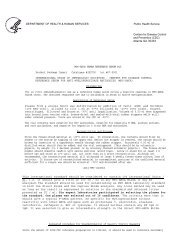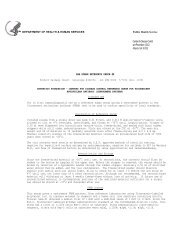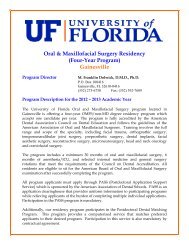gator dentist today - College of Dentistry - University of Florida
gator dentist today - College of Dentistry - University of Florida
gator dentist today - College of Dentistry - University of Florida
Create successful ePaper yourself
Turn your PDF publications into a flip-book with our unique Google optimized e-Paper software.
IVIAT/Continued from page 9.<br />
The technology also could be used in the study <strong>of</strong> an<br />
array <strong>of</strong> other diseases and pathogens, including anthrax and<br />
E. coli, Progulske-Fox said. Hamburger-loving Americans are<br />
especially at risk for contracting E. coli, a bad bug identified<br />
in 1982 after an outbreak <strong>of</strong> acute bloody diarrhea was traced<br />
to contaminated ground beef. E. coli is an emerging pathogen<br />
estimated by the Centers for Disease Control to sicken more<br />
than 70,000 U.S. citizens, killing dozens, every year.<br />
“IVIAT is perfect for the study <strong>of</strong> the infectious biological<br />
agents used in bioterrorism, about which very little is known,”<br />
said Progulske-Fox. “The same is true for emerging pathogens,<br />
about which even less is known. With IVIAT, you can get right<br />
to work on identifying important genes <strong>of</strong> the infectious agent<br />
with no previous knowledge <strong>of</strong> its pathogenesis (origin) or<br />
genetic system. It’s universally applicable.”<br />
In addition to their research on cholera, researchers<br />
are developing ways to identify the body’s genetic response<br />
to a host <strong>of</strong> cancerous, infectious and autoimmune diseases,<br />
such as diabetes and multiple sclerosis, which are good<br />
research candidates for a related iviGene-designed, patentpending<br />
technology named ISIAT, for In Situ-Induced Antigen<br />
Technology, said Progulske-Fox. ISIAT could potentially enable<br />
14 Gator Dentist Today Fall/Winter 2003<br />
Legacy <strong>of</strong> a Man<br />
Gordon Mattison Health Fair keeps the light alive<br />
By LAUREN BERNAT<br />
Toothpaste, dental floss, and school<br />
supplies were served to needy kids in<br />
Aug. — just in time for back to school<br />
Gordon Mattison, D.M.D.<br />
— at the Martin Luther King Center in<br />
Gainesville as part <strong>of</strong> the sixth annual<br />
Gordon Mattison Health Fair hosted<br />
by the UF chapter <strong>of</strong> the Student National Dental Association.<br />
Many families cannot afford even routine health<br />
screenings, so the association, whose goal for the fair is to<br />
promote oral health in minorities, <strong>of</strong>fered the services for free.<br />
“Our main goal was to raise parental awareness on<br />
children’s dental health and to provide dental education,” said<br />
Olubisi Aina, chair <strong>of</strong> the event.<br />
An estimated 200 people received free dental screenings<br />
and health information at the health fair. Also <strong>of</strong>fered were<br />
hearing and blood pressure tests, as well as legal advice and<br />
services. SNDA alumni, university student government, college<br />
departments and various individuals contributed to raise the<br />
$2,500 that helped host the free event.<br />
The donations helped secure the venue, hamburgers<br />
and hotdogs, a moonwalk and school supplies.<br />
“Most <strong>of</strong> the families surrounding the MLK<br />
neighborhood are in need <strong>of</strong> the school supplies we provided,”<br />
Aina said. “They may not have otherwise been able to afford<br />
them.”<br />
The school supplies ranged from pencils, pens, paper,<br />
crayons and rulers, Aina said. Supplies all students need for<br />
school.<br />
“Families had a<br />
great time, received school<br />
supplies and were informed<br />
about maintaining healthy<br />
teeth,” Aina said.<br />
Before his death<br />
from cancer in 1993 at the age<br />
<strong>of</strong> 44, Dr. Gordon Mattison,<br />
a pr<strong>of</strong>essor <strong>of</strong> endodontics<br />
at UF’s <strong>College</strong> <strong>of</strong> <strong>Dentistry</strong>,<br />
organized dental fairs<br />
for the community.<br />
Mattison created an annual<br />
community dental screening<br />
program in the late 1980s<br />
to provide much-needed<br />
UFCD dental students, Josette Vo (L)<br />
and Anabel Natali (R) examine the teeth<br />
<strong>of</strong> fair attendee, Rani Buchanan (8).<br />
(Photo – Sam Brill)<br />
preventive health screening to people who had little access to<br />
medical health care.<br />
March 21, 1998 marked the first Dr. Gordon Mattison<br />
Health Fair in honor <strong>of</strong> the man who strived to provide care for<br />
at-risk youth. The association, in hopes <strong>of</strong> keeping Mattison’s<br />
dream alive, has organized the free event every year since.<br />
researchers to identify genes the body switches on to fight illness,<br />
or those that abnormally turn on, thereby causing disease, as in<br />
the case <strong>of</strong> cancer, where cells begin to reproduce helter-skelter.<br />
Drugs then could be developed to suppress malfunctioning<br />
genes or to boost the efficiency <strong>of</strong> genes the body activates to<br />
attack an illness.<br />
The technology also could have agricultural<br />
applications, and preliminary studies are under way in plants<br />
at UF and iviGene. Ultimately, the research could help scientists<br />
develop crops with inherent resistance to plant pathogens,<br />
increasing crop yield and reducing dependence on insecticides<br />
and fungicides, Progulske-Fox said.<br />
“Although antibiotics and various other technological<br />
breakthroughs over the past 50 years have had an enormous<br />
impact on human health and well-being, infectious diseases,<br />
cancer and autoimmune diseases are still extremely prevalent,<br />
accounting for a vast amount <strong>of</strong> human deaths and suffering<br />
worldwide,” Hillman said.<br />
Yet useful vaccines only exist for a handful <strong>of</strong> the dozens<br />
<strong>of</strong> infectious diseases scientists have identified, Hillman said.<br />
“IVIAT technology is the fastest, simplest and most<br />
comprehensive method available for identifying good targets<br />
that may lead to new treatments and diagnostic tools,” he said.


